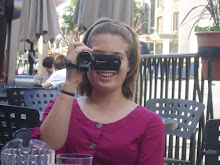For example, a week or so ago, a reader took them to task for mixing up "e.g." and "i.e."
The reader was correct, and polite and clear about it, and Marcie and Kathy recognized this. But they should have stopped there. Instead, they went on to say, "We often see and hear "i.e." applied to mean "for example" and had no idea it was incorrect. "
You spent decades editing a newspaper column syndicated around the world, and you had no idea it was incorrect? It's an easy mistake to use the wrong one here and there--we all do it. But it's frustrating to learn that professional writers and almost-journalists-by-proxy haven't heard of the difference between the two.
In another example, today they totally blew off a reader who wrote in to protest their use of the term "professional woman:"
Dear Annie: "Patrick in Stockton, Calif.," said men enjoy strip clubs because they aren't getting what they need from their wives at home. You said, "Insecure men often prefer professional women because they don't care what the guy is like as long as he has money."
As a practicing attorney, I consider myself a professional woman, and I most certainly DO care what a guy is like. I finally concluded you must have used the term "professional women" in reference to females who work in the sex trade. That's certainly an unconventional use of the word "professional."
My dictionary says a profession is "a calling requiring specialized knowledge and often long and intensive academic preparation." Strip clubs and lap dances? I don't think so. — Professional Woman
Dear Woman: Please tell us you are joking. "Professional woman" is a common term used to denote a female who is paid for sex-related work. A reference to "professional women" in a letter about strip clubs should not bring to mind an attorney, unless you have talents of which we are unaware.
Wait, a common term? Really? I've never heard the phrase used in that way, so I did a quick Google search. I was sure that if "professional woman" was code for "sex worker," the Internet would be kind enough to show me--probably graphically.
Top 10 results of my search?
1) Professional Woman Magazine Summer 2009. Featuring: Kimora Lee Simmons The Sassy and Savvy Business Woman
2) The Professional Woman Network is an international training organization designed to assist individuals in starting a consulting and seminar business
3) A collection of the best women's career networking and professional associations -- a guide for job-seekers.
4) The Professional Woman Speakers Bureau is a private, international network of independent consultants and trainers who are available to present workshops,
5) Professional Women's Network, Inc. is a professional organization of dynamic business and professional women in the Cedar Rapids, Iowa, area.
Ok, I think 5 is enough to make my point.
The most "colorful" things I saw were links to an association for professional women wrestlers, and one to a professional womens' rodeo association.
I scrolled through the first 5 pages of results, and nary a mention of sex workers. I think Marcy and Kathy are way off here, and it bothers me that they didn't even bother to LOOK before responding--and bashing their reader. "It's common" and "we hear it all the time" aren't explanations that inspire much confidence. Come on, ladies, get it together!
As a side note, the term professional woman is kind of an awkward one, suggesting that you've been trained as, and are being paid to act as, a woman (Hm, what would that look like?) as opposed to a professional lawyer, professional doctor, professional dancer, etc. It seems to me that "female professional" or "woman professional" would be the correct way to indicate that you're a professional [something], and also a woman.




